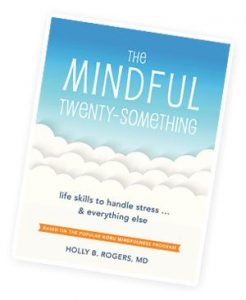
This morning while meditating I noticed some uncomfortable feelings: irritation and annoyance, even a touch of anger. At first, I was curious about those feelings. And then I made them a problem.
I could tell I made them a problem because I began to try to get rid of those feelings. I had the notion that I “shouldn’t” feel that way. Even though I know better, I still felt that the annoyance and irritation were “bad” feelings. I wanted a “good” meditation without unpleasant feelings. I began to relate to those unpleasant feelings as if they were problems.
Feelings are just feelings.
In truth, thinking that unpleasant feelings are a problem is simply a judgment call. It is also a judgment to think that feeling relaxed and blissful is best.
When you are just learning meditation, it is hard to understand that it’s not a problem if your mind is messy or restless and your emotions are as murky as Brunswick stew. It is hard to get comfortable with feeling uncomfortable.
There is nothing inherently good or bad about uncomfortable or comfortable feelings. In fact, they are just the same, simply the workings of our nervous system busily producing thoughts and sensations in response to the environment.
It’s nice to feel nice, and it’s also OK if you don’t.
Of course, we prefer to feel pleasant feelings. We confuse that preference with the belief that it is “bad” to have unpleasant feelings. You can notice that you prefer pleasant feelings without judging them to be “better” feelings. You can also notice that you do not prefer unpleasant feelings without making them a problem.
In her book Start Where You Are, Pema Chodron says about getting stuck by a focus on problems: “Problem-solving is based first on thinking there is a problem, and second on thinking there is a solution.” She goes on to say that the trap of identifying problems is that it can keep us stuck in thinking there is a right way and a wrong way. This can keep us mired in judgments and self-criticism.
Getting comfortable feeling uncomfortable takes patience and practice
In my experience working with new meditators, I find they are quick to feel they are doing meditation wrong if the experience is unpleasant. When you are just learning meditation, it is hard to understand that it’s not a problem if your mind is messy or restless and your emotions are as murky as Brunswick stew. It is hard to get comfortable with feeling uncomfortable.
In fact, one of the most important benefits of meditation practice is that it expands your ability to work with uncomfortable feelings without getting overwhelmed. Life gets easier when we start to trust that uncomfortable feelings are normal and temporary, and that we have a strategy for holding them with patience, kindness and some nice, deep breaths.
So what is a “good” meditation?
When you are having a “good” meditation, you are simply allowing whatever is present to be there, without judgment or struggle. This includes noting your preference for relaxation and your disapproval of discomfort. Of course, this capacity doesn’t show up overnight. It takes time and practice to let yourself relax into the flow of your experience. If you do start to feel overwhelmed by strong unpleasant feelings during meditation, it is time to take a break. And that is OK, too.
In my meditation practice this morning when I noticed my impulse to squash my feelings of irritation, I turned my attention to that squashing impulse. I tried to locate all the body sensations and thoughts that were associated with that pushing-away feeling. And then I made room for the irritation and welcomed it with kind curiosity. It made a great anchor for my awareness.
Curiosity and kindness are the attitudes we are cultivating about whatever shows up. When we can approach our meditation practice from that mental space, then we can welcome all the thoughts, sensations, and emotions that flow through us. There’s no problem after all.

Yes This makes total sense to me…instead of using all my energy to try to expel bad uncomfortable feelings…I can be curious about them and live with them for a while and hopefully they wont be such a tall mountain to climb.
I like the way you describe uncomfortable feelings as “a tall mountain to climb”. It is the nature of our feelings to change. And fortunately, they do it much faster than mountains do, even when if feels like they will never change. Patience, kindness, curiosity. Just like you are saying!